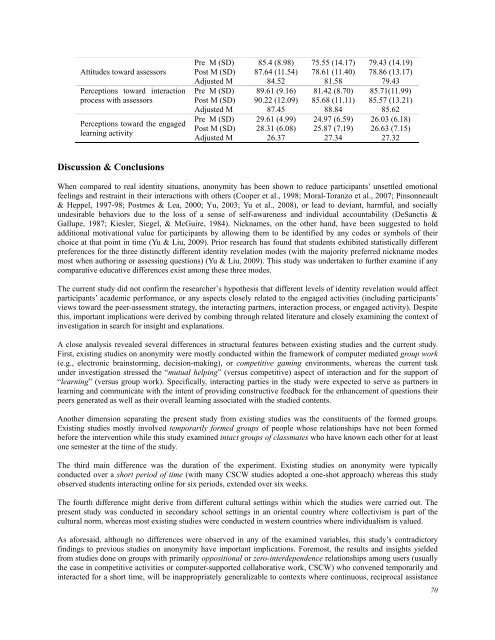January 2012 Volume 15 Number 1 - Educational Technology ...
January 2012 Volume 15 Number 1 - Educational Technology ...
January 2012 Volume 15 Number 1 - Educational Technology ...
Create successful ePaper yourself
Turn your PDF publications into a flip-book with our unique Google optimized e-Paper software.
Attitudes toward assessors<br />
Perceptions toward interaction<br />
process with assessors<br />
Perceptions toward the engaged<br />
learning activity<br />
Discussion & Conclusions<br />
Pre M (SD)<br />
Post M (SD)<br />
Adjusted M<br />
Pre M (SD)<br />
Post M (SD)<br />
Adjusted M<br />
Pre M (SD)<br />
Post M (SD)<br />
Adjusted M<br />
85.4 (8.98)<br />
87.64 (11.54)<br />
84.52<br />
89.61 (9.16)<br />
90.22 (12.09)<br />
87.45<br />
29.61 (4.99)<br />
28.31 (6.08)<br />
26.37<br />
75.55 (14.17)<br />
78.61 (11.40)<br />
81.58<br />
81.42 (8.70)<br />
85.68 (11.11)<br />
88.84<br />
24.97 (6.59)<br />
25.87 (7.19)<br />
27.34<br />
79.43 (14.19)<br />
78.86 (13.17)<br />
79.43<br />
85.71(11.99)<br />
85.57 (13.21)<br />
85.62<br />
26.03 (6.18)<br />
26.63 (7.<strong>15</strong>)<br />
27.32<br />
When compared to real identity situations, anonymity has been shown to reduce participants’ unsettled emotional<br />
feelings and restraint in their interactions with others (Cooper et al., 1998; Moral-Toranzo et al., 2007; Pinsonneault<br />
& Heppel, 1997-98; Postmes & Lea, 2000; Yu, 2003; Yu et al., 2008), or lead to deviant, harmful, and socially<br />
undesirable behaviors due to the loss of a sense of self-awareness and individual accountability (DeSanctis &<br />
Gallupe, 1987; Kiesler, Siegel, & McGuire, 1984). Nicknames, on the other hand, have been suggested to hold<br />
additional motivational value for participants by allowing them to be identified by any codes or symbols of their<br />
choice at that point in time (Yu & Liu, 2009). Prior research has found that students exhibited statistically different<br />
preferences for the three distinctly different identity revelation modes (with the majority preferred nickname modes<br />
most when authoring or assessing questions) (Yu & Liu, 2009). This study was undertaken to further examine if any<br />
comparative educative differences exist among these three modes.<br />
The current study did not confirm the researcher’s hypothesis that different levels of identity revelation would affect<br />
participants’ academic performance, or any aspects closely related to the engaged activities (including participants’<br />
views toward the peer-assessment strategy, the interacting partners, interaction process, or engaged activity). Despite<br />
this, important implications were derived by combing through related literature and closely examining the context of<br />
investigation in search for insight and explanations.<br />
A close analysis revealed several differences in structural features between existing studies and the current study.<br />
First, existing studies on anonymity were mostly conducted within the framework of computer mediated group work<br />
(e.g., electronic brainstorming, decision-making), or competitive gaming environments, whereas the current task<br />
under investigation stressed the “mutual helping” (versus competitive) aspect of interaction and for the support of<br />
“learning” (versus group work). Specifically, interacting parties in the study were expected to serve as partners in<br />
learning and communicate with the intent of providing constructive feedback for the enhancement of questions their<br />
peers generated as well as their overall learning associated with the studied contents.<br />
Another dimension separating the present study from existing studies was the constituents of the formed groups.<br />
Existing studies mostly involved temporarily formed groups of people whose relationships have not been formed<br />
before the intervention while this study examined intact groups of classmates who have known each other for at least<br />
one semester at the time of the study.<br />
The third main difference was the duration of the experiment. Existing studies on anonymity were typically<br />
conducted over a short period of time (with many CSCW studies adopted a one-shot approach) whereas this study<br />
observed students interacting online for six periods, extended over six weeks.<br />
The fourth difference might derive from different cultural settings within which the studies were carried out. The<br />
present study was conducted in secondary school settings in an oriental country where collectivism is part of the<br />
cultural norm, whereas most existing studies were conducted in western countries where individualism is valued.<br />
As aforesaid, although no differences were observed in any of the examined variables, this study’s contradictory<br />
findings to previous studies on anonymity have important implications. Foremost, the results and insights yielded<br />
from studies done on groups with primarily oppositional or zero-interdependence relationships among users (usually<br />
the case in competitive activities or computer-supported collaborative work, CSCW) who convened temporarily and<br />
interacted for a short time, will be inappropriately generalizable to contexts where continuous, reciprocal assistance<br />
70

















